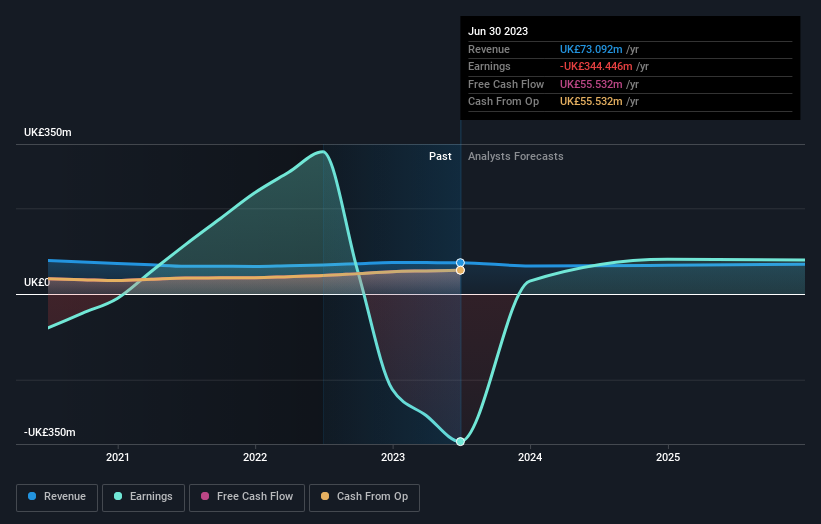- United Kingdom
- /
- REITS
- /
- LSE:UKCM
Investors in UK Commercial Property REIT (LON:UKCM) from five years ago are still down 9.9%, even after 5.2% gain this past week

While it may not be enough for some shareholders, we think it is good to see the UK Commercial Property REIT Limited (LON:UKCM) share price up 19% in a single quarter. But if you look at the last five years the returns have not been good. In fact, the share price is down 29%, which falls well short of the return you could get by buying an index fund.
While the stock has risen 5.2% in the past week but long term shareholders are still in the red, let's see what the fundamentals can tell us.
See our latest analysis for UK Commercial Property REIT
In his essay The Superinvestors of Graham-and-Doddsville Warren Buffett described how share prices do not always rationally reflect the value of a business. By comparing earnings per share (EPS) and share price changes over time, we can get a feel for how investor attitudes to a company have morphed over time.
During five years of share price growth, UK Commercial Property REIT moved from a loss to profitability. However, it made a loss in the last twelve months, suggesting profit may be an unreliable metric at this stage. Other metrics might give us a better handle on how its value is changing over time.
The most recent dividend was actually lower than it was in the past, so that may have sent the share price lower. The revenue decline of around 2.1% would not have helped the stock price. So it seems weak revenue and dividend trends may have influenced the share price.
The graphic below depicts how earnings and revenue have changed over time (unveil the exact values by clicking on the image).

Balance sheet strength is crucial. It might be well worthwhile taking a look at our free report on how its financial position has changed over time.
What About Dividends?
As well as measuring the share price return, investors should also consider the total shareholder return (TSR). Whereas the share price return only reflects the change in the share price, the TSR includes the value of dividends (assuming they were reinvested) and the benefit of any discounted capital raising or spin-off. So for companies that pay a generous dividend, the TSR is often a lot higher than the share price return. As it happens, UK Commercial Property REIT's TSR for the last 5 years was -9.9%, which exceeds the share price return mentioned earlier. The dividends paid by the company have thusly boosted the total shareholder return.
A Different Perspective
We're pleased to report that UK Commercial Property REIT shareholders have received a total shareholder return of 11% over one year. Of course, that includes the dividend. There's no doubt those recent returns are much better than the TSR loss of 1.9% per year over five years. This makes us a little wary, but the business might have turned around its fortunes. While it is well worth considering the different impacts that market conditions can have on the share price, there are other factors that are even more important. For example, we've discovered 1 warning sign for UK Commercial Property REIT that you should be aware of before investing here.
If you are like me, then you will not want to miss this free list of growing companies that insiders are buying.
Please note, the market returns quoted in this article reflect the market weighted average returns of stocks that currently trade on British exchanges.
New: AI Stock Screener & Alerts
Our new AI Stock Screener scans the market every day to uncover opportunities.
• Dividend Powerhouses (3%+ Yield)
• Undervalued Small Caps with Insider Buying
• High growth Tech and AI Companies
Or build your own from over 50 metrics.
Have feedback on this article? Concerned about the content? Get in touch with us directly. Alternatively, email editorial-team (at) simplywallst.com.
This article by Simply Wall St is general in nature. We provide commentary based on historical data and analyst forecasts only using an unbiased methodology and our articles are not intended to be financial advice. It does not constitute a recommendation to buy or sell any stock, and does not take account of your objectives, or your financial situation. We aim to bring you long-term focused analysis driven by fundamental data. Note that our analysis may not factor in the latest price-sensitive company announcements or qualitative material. Simply Wall St has no position in any stocks mentioned.
About LSE:UKCM
UK Commercial Property REIT
UK Commercial Property REIT Limited (“UKCM”) is a listed Real Estate Investment Trust (REIT) with a net asset value of £1.1 billion as at 30 June 2023.
Adequate balance sheet second-rate dividend payer.
Similar Companies
Market Insights
Community Narratives




